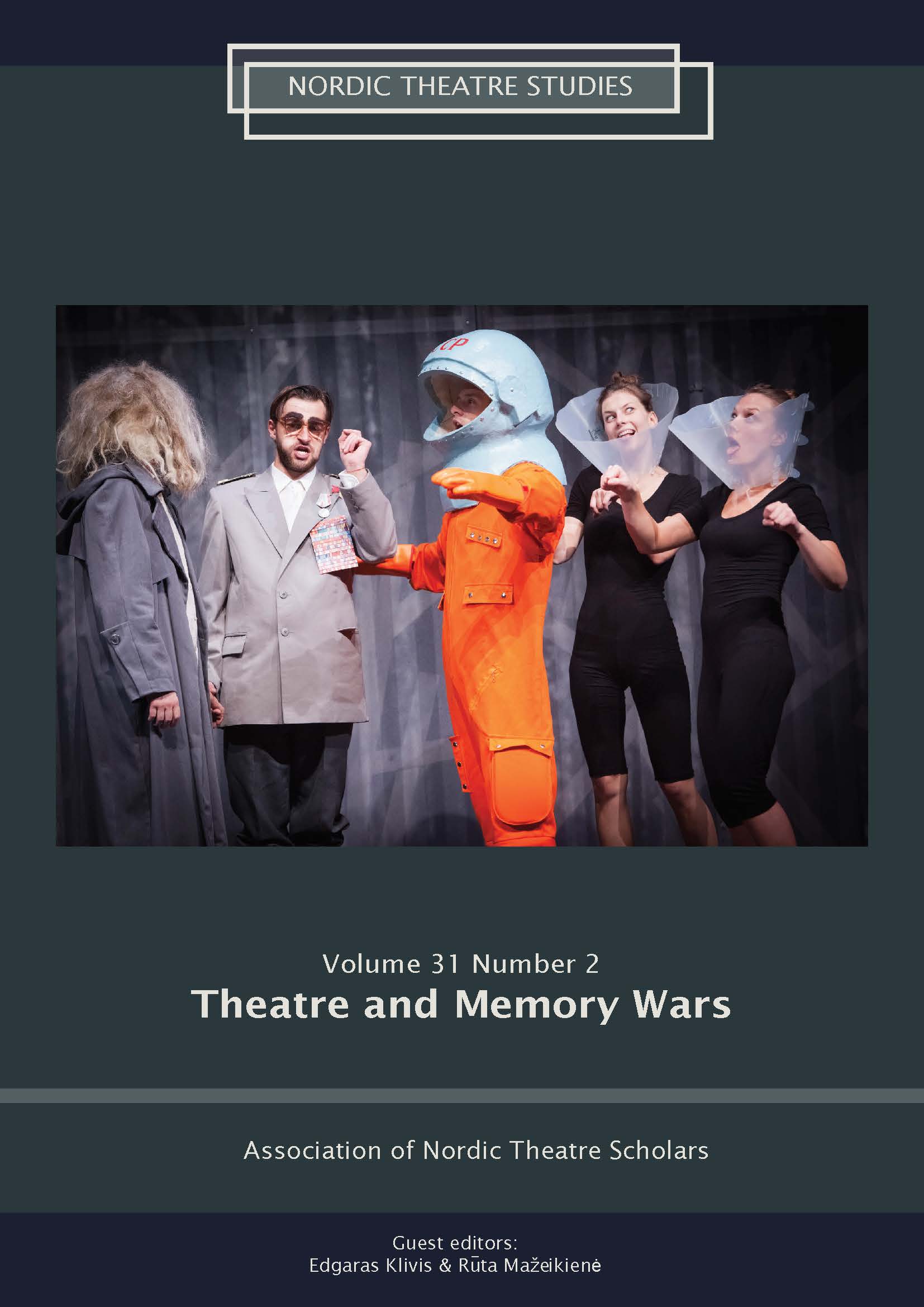Making Your Own Story of It
Oliver Frljić’s Klątwa (Engl.: “The Curse”) in Warsaw as a Theatre of Emancipation
DOI:
https://doi.org/10.7146/nts.v31i2.120120Keywords:
Oliver Frljić, Jacques Rancière, Polish theatre, Political theatre, Contemporary theatre, HistoriographyAbstract
The paper discusses Oliver Frljić’s production of Klątwa(Engl.: “The Curse”) which is based on the play with the same title by Stanisław Wyspiański. Klątwapremiered in Teatr Powszechny in Warsaw on 18 February 2017 and created the biggest theatre scandal in the early theatre history in Poland as both the right-wing government and the right-wing movement in Poland regarded it as blasphemous and – unsuccessfully – tried to prevent further performances. In KlątwaOliver Frljić questions the understanding of historiography promoted by the Polish government that prefers to focus only on stories about heroes and he criticises both the abuse of power in the church and in the institutionalized theatre. The strategies of Oliver Frljić’s political theatre are analyzed in the light of Jacques Rancière’s thoughts about critical theatre. In Klątwa Frljić develops a theatre of dissensus in the sense of Rancière. He undertakes a “dissensual re-configuration”[1]of political theatre by changing the frames, by playing around and by questioning the means used in theatre. But Frljić also deviates from this strategy when he creates images on stage that convey meanings directly and simply. Yet, these images fit into Frljić’s strategy of questioning the official Polish historiography by deconstructing the symbols it is based on. Oliver Frljić’s theatre of emancipation, a theatre that believes in the potential of the spectator to emancipate him- or herself as suggested by Rancière in The Emancipated Spectator (Rancière 2009), manages to make visible authoritarian and undemocratic developments in Polish politics and to offer a critical approach to history in contrast to the one-sided view the Polish government tries to establish.
[1]Rancière 2010, p. 140.
References
“Australischer Bischoff beklagt Schweigen von Johannes Paul II”. zeit.de. 24.08.2015 http://www.zeit.de/gesellschaft/2015-08/missbrauch-kirche-papst-johannes-franziskus-australienkatholisch (12.07.2019).
“Vorwurf: Polens Regierung begünstigt pädophile Priester”. katholisch.de. 08.01.2018. http://www.katholisch.de/aktuelles/aktuelle-artikel/vorwurf-polens-regierung-begunstigtpadophile-priester (12.07.2019).
Adamiecka-Sitek, Agata, and Keil, Marta. 2015. “Whose National Theatre Is It? Oliver Frljić in Conversation with Marta Keil and Agata Adamiecka-Sitek”. Polish Theatre Journal. 01/2015, p. 1-14.
Adamiecka-Sitek, Agata. 2017. “How to Lift the Curse? Director Oliver Frljić and the Poles”. Polish Theatre Journal. 1-2/2017. http://www.polishtheatrejournal.com/index.php/ptj/article/view/111/421 (12.07.2019).
Adamiecka-Sitek, Agata, and Keil, Marta. 2017. “Polish Theatre after Klątwa: Pawel Paweł Łysak and Paweł Sztarbowski, directors of the Powszechny Theatre in Warsaw, in Conversation with Agata Adamiecka-Sitek and Marta Keil”. Polish Theatre Journal. 1-2/2017, http://www.polishtheatrejournal.com/index.php/ptj/article/view/129/412 (12.07.2017). Burzyńska, Anna R. 2017. “Chronik des (un)guten Wechsels”. Theater der Zeit. October 2017, No 10, p. 15-18.
Esch-van Kan, Anneka. 2012. “Zum Fehlen einer gemeinsamen Sprache. Zum Verhältnis von Theorie und Praxis (des Theaters)”. Nikolaus Müller-Schöll, André Schallenberg and Mayte Zimmermann. Performing Politics. Berlin: Verlag Theater der Zeit, p.127-128.
Friszke, Andrzej. 2009. Polen. Geschichte des Staates und der Nation. Berlin: Verlag für Wissenschaft und Forschung.
Krakowska, Joanna. 2018. “Auto-theatre in the era of post-truth”. Polish Theatre Journal. 1(5)/2018, p. 1-7.
Miązek, Bonifacy. 1984. Polnische Literatur 1863-1914, Wien: Gerda Leber Verlag.
Plata, Tomasz. 2018. “Post-Theatre: Escaping from Theatre, Escaping to Theatre”. Polish Theatre Journal. 1(5)/2018, p. 1-13.
Rancière, Jacques. 2002. Das Unvernehmen, Frankfurt a.M.: Suhrkamp Verlag.
Rancière, Jacques. 2009. The Emancipated Spectator, London: Verso.
Rancière, Jacques. 2010. Dissensus on Politics and Aesthetics. London: Continuum International Publishing Group.
Sugiera, Małgorzata. 1993. “Romantik und Avantgarde”. Welttheater – Nationaltheater – Lokaltheater. Europäisches Theater am Ende des 20. Jahrhunderts. Erika Fischer-Lichte and Harald Xander. Tübingen: Francke Verlag. p. 57-74.
Szydło, Beata. 2015. “Policy Statement by Prime Minister Beata Szydło”. premier.gov.pl. 18.11.2015. https://www.premier.gov.pl/en/policy-statement-by-prime-minister-beata-szydlostenographic-record.html (12.07.2019).
Wihstutz, Benjamin. 2012. Der soziale Raum. Politiken sozialer Grenzverhandlung im Gegenwartstheater, Berlin: diaphanes.
Downloads
Published
How to Cite
Issue
Section
License
The copyright belongs to the authors and Nordic Theatre Studies. Users can use, reuse and build upon the material published in the journal but only for non-commercial purposes. Users are allowed to link to the files, download the files, distribute the files on a local network (preferably by links), upload the files to local repositories if their institutions require them to do so, but not republish the files without proper agreements with the journal and the author.

